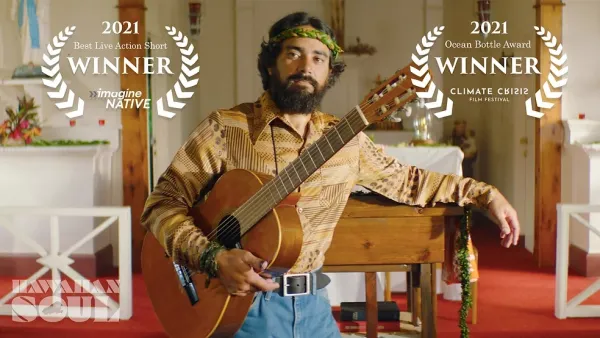The Activist/Musician Who Beat the U.S. Military: Hawaiian Hero Helm Rides the Wild Cinematic Surf Again
Hawaiian Soul was screened on the opening day of the 38th annual Los Angeles Asian Pacific Film Festival, which provides a launching pad for Indigenous Pacific Islander productions in Hollywood. Shorts, documentaries, animation and features by and about the Native peoples of Polynesia, Melanesia and Micronesia, as well as by Asian and Asian-American filmmakers, are being screened at various venues in the world’s movie capital by this filmfest that spotlights South Seas Cinema, taking place May 5-13.
Since 1983 Visual Communications, a nonprofit organization, has presented LAAPFF, dedicated “to develop and support the voices of Asian American and Pacific Islander filmmakers and media artists who empower communities and challenge perspectives.” The L.A. presentation of the outstanding Hawaiian Soul is a perfect onscreen expression of this mission statement by LAAPFF, which provides a perch for works by and about Oceanic talents and topics in Los Angeles. The below is the first in a series of reviews of selections from this year’s Pacific Islander works at LAAPFF.
HAWAIIAN SOUL: ACTIVIST/MUSICIAN GEORGE HELM AND HELMER ʻĀINA PAIKAI
Hawaiian filmmakers are currently in the movie capital of the world presenting their films at LAAPFF, arguably the premiere venue for Hawaii/Pacific Islander productions in L.A. and the continental U.S. On May 5 I attended the “Indigenous Now” program of shorts from Hawaii, Fiji, Samoa, Aotearoa/New Zealand, the Philippines and beyond (see: https://festival.vcmedia.org/2022/programs/indigenous-now/). Although several of the shorts were well-made, the best of them by far is Kamakanioka ʻĀina Paikai’s beautiful Hawaiian Soul. This biopic about the great Hawaiian activist and musician George Helm (Kolea Fukumitsu) is a short crying out to be a feature-length film, if not a Lawrence of Arabia type epic.
Unlike T.E. Lawrence, the Molokai-bred Helm shared the same ethnicity as the people he led and inspired. The fabled Helm was renowned for his good looks, charisma, musical talent but most of all as a co-leader of the movement to stop the U.S. Navy from using the Hawaiian Island of Kaho’olawe for target practice. In 1976 Helm was part of a courageous small band of Hawaiians (and one American Indian female ally!) that illegally landed at Kaho’olawe, occupying the isle near Maui’s coast in order to stop the Pentagon’s bombing there.
In addition to Helm, some of the other initial occupiers are portrayed in this dramatic narrative short, including Lohiao Paoa as the bold Walter Ritte, Mataio Sibayan as Dr. Emmett Aluli and Kaliko Ma‘i‘i as a character named “Steve,” who may be Stephen Morse, one of the original intrepid “invaders” who wrote an account of their illegal “intrusion” on the Hawaiians’ indigenous isle called First Landing. Raiatea Helm, one of Hawaii’s greatest contemporary musicians and George’s niece, plays a character aptly referred to in the cast credits as “Songbird.”
Kolea Fukumitsu uncannily resembles Helm, whose saga gained mythic proportions because ultimately the unarmed Hawaiians prevailed over the world’s mightiest military – and during one of the protests, the dauntless George and Kimo Mitchell paid the ultimate price. They were mysteriously lost at sea, and foul play has long been suspected. I knew the latter’s father, who I first encountered in 1983 at Vanuatu where I was covering the Nuclear Free and Independent Pacific conference, and when I asked Uncle Harry what his theory was about the demise of his son and George, he fell sadly silent.
Hawaiian musician/academic Jon Osorio, now Dean of Hawaiʻinuiākea School of Hawaiian Knowledge at the UH, wrote the stirring, ethereal song Hawaiian Soul to pay homage. Perhaps his true revolutionary story could also be called “Hawaiian Soul on Ice.”
I never had the honor to meet the mythic George when I lived in Oahu reporting on the Hawaiian Sovereignty movement after Helm had already vanished, but Kamakanioka ʻĀina Paikai seems to have perfectly captured his legendary mystique in Hawaiian Soul. The Hawaiian helmer has distilled the essence of Helm’s message of “Aloha ʻĀina” – “love the land” – and rendered it in cinematic form, with exquisite camerawork by Michael Tanji. They are expressing “Hawaiian-ness” through the camera lens and cinematic medium.
Both Paikai and Tanji appeared in person at the LAAPFF screening where the writer/director fielded questions at the conclusion of the “Indigenous Now” program of Pacific shorts. Paikai asserted that Helm is “our Martin Luther King” – although I’d hasten to add he was actually a combination of MLK with Aretha Franklin’s musicality and Billy Dee Williams’ handsome features. Paikai added that he shot Hawaiian Soul on location at Molokai, enhancing the film’s authenticity and his ability to gain the respect and trust of the Helm ohana (family).
A former Sundance Native Lab Fellow and ‘Ōiwi TV documentarian, Paikai is the founder of his production company Kamaʻāina Creations and a gifted artist. As a chronicler of Hawaiian/South Seas Cinema, I first encountered Paikai’s work at the 2012 LAAPFF, where his hilariously funny short Moke Action was screened and I wrote about in The Hawaii Movie and Television Book, in the section immediately following George Clooney’s The Descendants, based on the novel by Hawaiian author Kaui Hart Hemmings.
For more info about Hawaiian Soul,which is presented by Pacific Islanders in Communications see: https://www.facebook.com/hawaiiansoulmovie/ ; https://www.hawaiiansoulmovie.com/?fbclid=IwAR1iAxjiH8JlL2yx-8ImS5IeoZLt4z3NNYNp_grQGkZIs_At0DMUlg64_Sg.
Tongan director Isaac Halasima’s documentary Waterman, the Duke Kahanamoku biopic, is having its L.A. premiere screened on Sunday, with the filmmakers in attendance. For more info about the Los Angeles Asian Pacific Film Festival see: https://festival.vcmedia.org/2022/.
Film historian/critic Ed Rampell lived in the Pacific Islands for 23 years, including about half that time at Makaha, Oahu, was featured in the 2005 Australian documentary Hula Girls: Imagining Paradise, and co-authored three movie history books about South Seas Cinema, including The Hawaii Movie and Television Book (https://mutualpublishing.com/product/the-hawaii-movie-and-television-book/). His Polynesian daughter Marina Davis is one of Samoa’s top singers.



